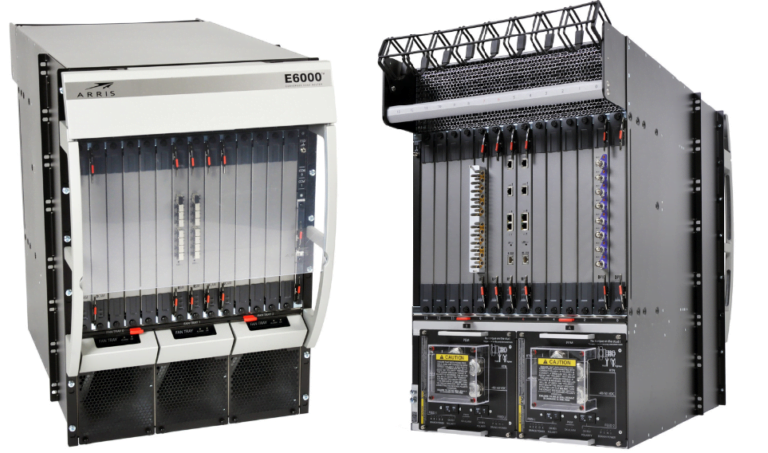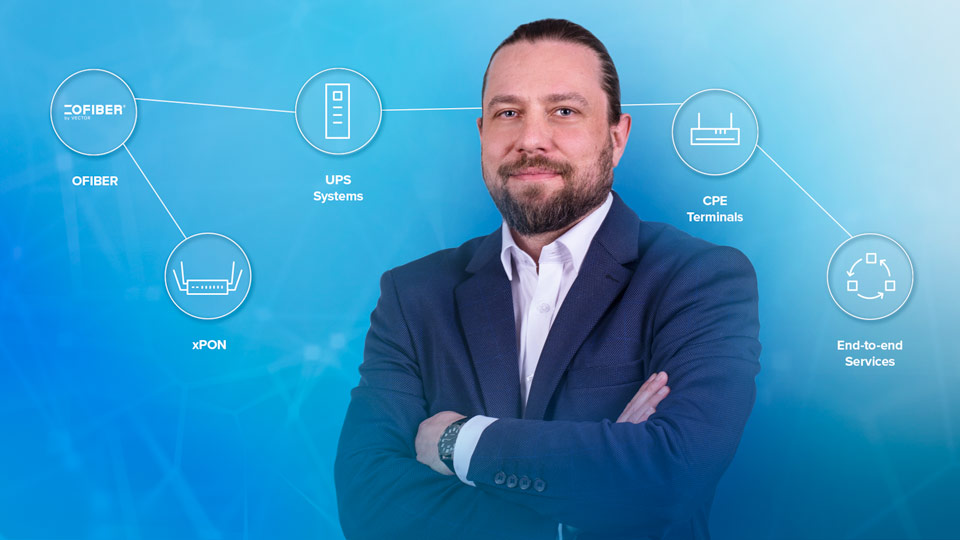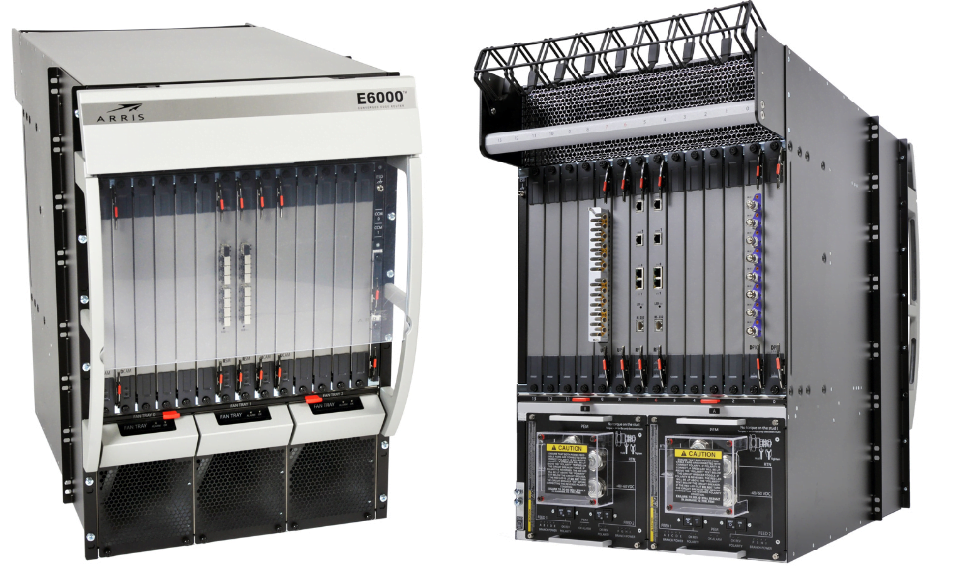Oferta usług utrzymania systemów obejmuje 6 pakietów usług pomocy technicznej VECTOR SOLUTIONS:V-AID Service / EW / NBD / NBD+EW / 24h / 24h+EW.Umożliwiają one wykorzystanie potencjału Firmy VECTOR w zakresie codziennego wsparcia technicznego, rozwiązywania problemów, szybkiego reagowania na problemy krytyczne w sieci oraz utrzymania systemu na najwyższym poziomie wydajności oraz planowania rozwoju sieci.
Produkty
ARRIS E6000
Flexible, Upgradeable CCAP™ for Integrated, DAA for DOCSIS 3.0/3.1 Deployments
Opis produktu ARRIS E6000
The ARRIS E6000® Converged Edge Router (CER) is the industry-leading Converged Cable Access Platform (CCAP™). It provides cable Service Providers unprecedented advances in channel density, power efficiency, and cost savings in a redundant, integrated architecture, designed from the ground up for high availability.
This powerful design enables the convergence of all services (video, high-speed data, and voice) on a single physical connector, delivering savings in capital and operational expenditures, along with increased operational efficiency. Advances in the platform are enabling operators to provide more bandwidth to their subscribers through additional access technologies and architectures.
Service Providers are facing several factors that drive the need for additional bandwidth delivery and the access technologies that are enabled by the E6000 CER:
- Exponential growth in bandwidth demands for both residential and commercial high-speed broadband data services.
- Converging MPEG video services on the CCAP while replacing aging Edge QAM products.
- Migration to IP video distribution services.
The E6000 CER enables a managed approach to this evolution with a combination of software-only density upgrades to existing modules, as well as new modules to unlock even higher densities and additional access technologies. The E6000 CER supports multiple deployment architectures and technologies:
- Integrated CCAP (I-CCAP) for Traditional Hybrid Fiber Coax (HFC) networks
- Remote PHY Distributed Access Architecture
- 10G EPON Optical Line Terminal (OLT) support for Fiber to the X (FTTX)
The E6000 Generation 2 (Gen 2) modules (DCAM-2, UCAM-2, RSM-2, and EPFM) deliver additional service group density and greater throughput:
- Substantially increase service group density relative to E6000 Generation 1 modules.
- Facilitate a Pay-as-you-Grow model with increased channel density per service group, enabled by the application of the appropriate DOCSIS® 3.0 Single Carrier QAM (SC-QAM), DOCSIS 3.1 OFDM, and video licenses.
For service groups where Service Providers want to deploy or migrate to FTTX, the 10G EPON Fiber Module (10G EPFM) can be deployed along with the RSM-2 in the E6000 CER to support XFP-based, non-blocked 10G EPON ports. The 10G EPFM leverages the existing E6000 features as well as DOCSIS Provisioning of EPON (DPoE) version 2.0 to preserve Service Provider’s DOCSIS-based back-office provisioning and tools.
Specyfikacja techniczna
| SUMMARY OF NEW & EXISTING FEATURES (PARTIAL LIST) | |
| 96 Downstream Service Groups and 96 Upstream Service Groups per Chassis (Gen 2) |
DCAM-2 Annex A: 44 SC-QAMs (max 32 EuroDOCSIS) + 192 MHz OFDM DCAM-2 Annex B: 48 SC-QAMs (max 32 DOCSIS) + 192 MHz OFDM |
| DOCSIS 3.1 Downstream Support (with Annex A) No hardware upgrade required Per F connector 96 MHz OFDM + up to 36 SC-QAMs (max 32 for EuroDOCSIS) |
DOCSIS 3.1 Downstream Support (with Annex B) No hardware upgrade required Per F connector 96 MHz OFDM + up to 48 SC-QAMs (max 32 for DOCSIS) |
| Integrated Edge QAM (IEQ) Feature Set (Annex A): Table-based VOD SDV DVB Simulcrypt Encryption 36 Annex A QAMs per connector Max 32 EuroDOCSIS QAMs, max 16 TBVOD, max 8 SDV or SBVOD |
Integrated Edge QAM (IEQ) Feature Set (Annex B): Table-based VOD SDV + Session-based VOD (ISA spec) VPME Encryption 48 Annex B QAMs per connector Max 32 DOCSIS QAMs, max 32 VOD |
| MPLS L2VPNs: Point-to-point architecture (VPWS) Remote LDP Signaling PE router operation 16,000 VPNs per chassis Pseudo-wire Redundancy CLI-based Assignment of a Modem to a VPN |
DOCSIS 3.1 Downstream Enhancements: OFDM Block Size Flexibility (as low as 24 MHz) 2.5 usec Cyclic Prefix LDPC Shortened Codeword Exclusion Band Support (DCAM and DCAM-2) |
| MPLS L3VPNs: 63 non-default VRFs RIPv2 Passive Mode, static, or local routing Route leaking via static routes Dot1q encapsulation MPLS Ping and Traceroute |
IPv6 Support: IS-IS MT and OSPFv3 Prefix Delegation with Prefix Stability IPv6 CM Management Dual-Stack CPE IPv6 Distribute Lists ND and DHCPv6 Throttling IPv6 TFTP Enforce IPv6 Lease Query with Bulk Lease Query Cable Source Verify Extended ACLs |
| IPv6 Multi-VRF Support IPv6 in up to four non-default VRFs OSPFv3 or IS-IS MT |
Hitless Bonded Modem Load Balancing via Dynamic Bonding Change (DBC) Hitless Bonded Modem Movement via DBC initiated by CLI |
| Bonding of 32 Downstream Channels | Upstream Channel Bonding (up to 8 Channels) |
| 48 DOCSIS SC-QAMs per DS Port (no IEQ, no OFDM) | 5 to 85 MHz Upstream Support (UCAM and UCAM-2) |








